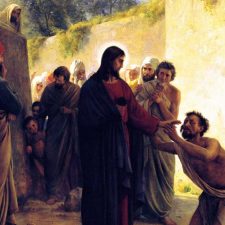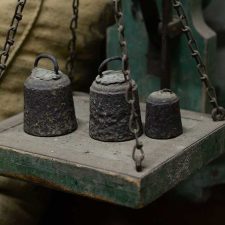In Luke 15:11–32, Jesus tells the parable of the prodigal son. This description only captures the first half of the parable (15:11–24), which will be the focus of this post. Charles Dickens reputedly called it “the greatest short story of all time.” It is also referred to in Shakespeare’s The Merchant of Venice and has inspired masterpieces such as Dickens’ Great Expectations, paintings such as Rembrandt’s Return of the Prodigal Son, and lyrics amongst artists as diverse as Everlast, Keith Green, the Rolling Stones, and U2.
Elements of the parable have entered our common language. Even Michael Scott from The Office, when reuniting with Jim, could say, “the prod . . . er . . . prodigal . . uh . . . my son returns,” with the assumption that his audience would understand the reference, however fumbled it was.
This is especially revealing. It demonstrates that for many the traditional description of this parable is still familiar to them without even knowing what it means. I would like to describe briefly what this parable really teaches, what the term “prodigal” means, and why we so often attribute the term to the wrong person in the story.
A Better Title
“There was a man who had two sons” (Luke 15:11). The hero in this story is a respectable owner of an estate with servants and fatted calves to spare. Jesus’ story implies that this father, however, is most foolish. It is not his money that makes him foolish. It is not a lack of status. It is his love for a son.
There is something timeless and familiar about the younger son. With the world before him, he demands his inheritance early, gathers his portion, and he runs. More audacious, as we will discuss shortly, is the father’s response. The father acquiesces rather than rebukes. Moreso, the father gives over his property (lit. “his life”) to divide between the brothers. The father gives it all.
The parable indicates that both the father and the younger son act dishonorably here. The father apparently ignores the wisdom of the ancient scribe, Ben Sira: “In all that you do retain control . . . When the days of your life reach their end, at the time of your death distribute your property” (33.23–24). Likewise, land and possessions in Jewish antiquity were highly prized and preserved through family lines. In this instance, the younger son sells off not merely what his father would have worked for but likely what his father was given by the generations preceding him.
The father’s permissiveness extends beyond granting the wish of dividing the inheritance prematurely. At any instance, the father could regain control over his son’s actions and prevent him from selling off the family possessions. No such actions appear to be taken.
The son, in response, takes all that his father worked for and gave him and wastes it with what has been understood and translated as “wild living,” “a prodigal lifestyle,” or what Walter Bauer refers to as “a madness that knows no bounds.” This is where the term “prodigal” comes from. Prodigal means “lavish” or “wasteful.” As we will see, a better title for the parable is, “The Parable of the Prodigal Father.”
Like the People That Moved Jesus
Having squandered his inheritance, the details of the younger’s son condition resonate with the timeless, common afflictions that have faced every generation: failure, desperation, and abandonment. Although the older son would later tell his father that the younger son “wasted his inheritance on prostitutes” (15:30), it is unclear if Jesus intends us to believe this. There is nothing in the parable, per se, that indicates that this younger son’s exploits were sexual in nature versus a mere reckless opportunism. The point is that he gambled it all. And lost.
Following his complete failure, the son was exposed to the types of famine that ravished Palestine and its surrounded regions on a regular basis. Like many, the younger son was both a responsible agent and unwitting victim in his circumstance. He was forced to sell himself to foreigner, to “a citizen,” who, under such a contract, had complete authority over the man’s daily life.
In this case, it was the son’s task to feed this foreigner’s pigs. This is emphasized by Jesus to paint a picture of this man as a reckless, foolish disappointment. Pigs were so loathed by Jewish people that archeologists use the presence or absence of their bones to determine the settlement distributions of Jews in antiquity. In their eyes, they were the most unclean of animals, and this younger son was not even permitted, so to speak, to eat the food that fell from the pigs’ table (cf. Matt 15:27).
The son was in worse condition than the dogs that roamed the streets of Palestine. He was like a harlot who sold herself for survival. He was like a tax collector who betrayed his people. He was like a leper, unclean and exiled and hopeless. He was, in other words, like all the people that moved Jesus.
Shame, Shame, Shame
Everything we have learned about first century Jewish culture increases the shame that runs through the story. It is shameful for a son to demand his father’s inheritance before he dies. It is shameful to abandon your family. It is shameful to neglect to care for your father in his old age. It is shameful to squander your inheritance and your family’s name. It is shameful to abandon your identity as a Sabbath-observant Jew, which the younger son surely would have done under his new labor contract. It is shameful to feed the pigs of a foreigner.
At this moment, the son literally “comes to himself” (15:17) and comes up with a strategy (15:18–19): “I will set out and go back to my father and say to him: ‘Father, I have sinned against heaven and against you. I am no longer worthy to be called your son; make me like one of your hired servants.’” Although some bible teachers claim that this amounts to repentance, there are several reasons to doubt it.
Whenever there is internal dialogue in the parables in Luke’s Gospel, they give the hearer or reader insight into the depravity of a character’s intentions. For example, the rich hoarder says to himself, “This is what I’ll do. I will tear down my barns and build bigger ones . . . And I’ll say to myself, ‘You have plenty of grain laid up for many years. Take life easy; eat, drink and be merry’” (12:18–19). The shrewd manager, before unjustly reducing the debts of his master’s debtors, says, “What shall I do now? My master is taking away my job. I’m not strong enough to dig, and I’m ashamed to beg . . .” (16:3). Every instance of internal dialogue in a parable of Luke’s Gospel seems designed to accentuate moral ambiguity.
Moreso, the younger son rehearses his lines: “I have sinned against heaven and against you,” and these words mirror those of Pharoah to Moses: “I have sinned against God and against you” (Ex 10:16). This son’s heart is no softer than the Egyptian. But he believes his father has food to spare. He leaves (likely under the cover of darkness), abandoning the obligations of his labor contract, and he decides to become his father’s servant instead.
But when his father sees him, his shame, too, knows no bounds (Luke 15:20). Seeing his child from a far distance, he runs with self-abandon to embrace him. This father, too, has been shameful. He failed to discipline his son. He failed to keep him from wrongdoing. And now he fails to be honorable. Grown men in Palestine are not encouraged to hike up their robes to run, exposing their legs. But the father does much more. He gives a dishonorable son the “best robe.” Whose robe is this? The father’s own. He gives his son the signet ring of responsibility. Whose ring is this? The father’s own. And he slaughters the fatted calf for him. Such a calf could feed up to a hundred people; a whole village could be invited.
The True Prodigal
A great party ensues. But it is also a completely unexpected party, and this creates an insight into the father’s joy. A fatted calf took approximately six months to prepare for a slaughter after its birth. It would be penned up and confined to limit weight loss. These animals were not merely there for the taking at any moment, but they were groomed for special occasions such as weddings or communal feasts. The father must already have been grooming this calf for a special occasion. Its slaughter did not merely result in an extravagant feast for a wasteful son; it meant that whatever occasion the father had saved it for would be deprived of its fatted calf.
This is why the father is the true “prodigal.” He is heedless, wasteful, and excessive in his gracious joy. His is a madness that knows no bounds. His is a picture of the prodigal love of God.
This blog post is based on an excerpt from For People Like Us: God’s Search for the Lost of Luke 15. It has been reprinted exclusively to this blog with permission from Wipf & Stock.Luuk van de Weghe (PhD, University of Aberdeen) is the author of For People Like Us: God’s Search for the Lost of Luke 15. He has publicly debated leading skeptics and has been published in preeminent peer-reviewed journals such as New Testament Studies, Tyndale Bulletin, and Bulletin for Biblical Research.https://www.luukvandeweghe.com/publications.html













